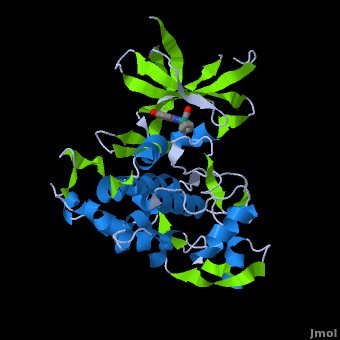Serine/threonine protein kinase
From Proteopedia
(Difference between revisions)
| Line 3: | Line 3: | ||
* '''Serine/threonine protein kinase''' 1 (Chk1) phosphorylates cdc25A, cdc25B and cdc25C. Upon phosphorylation, cdc25 binds adaptor protein and the cell is prevented from entering mitosis<ref>PMID:12781359</ref>.<br /> | * '''Serine/threonine protein kinase''' 1 (Chk1) phosphorylates cdc25A, cdc25B and cdc25C. Upon phosphorylation, cdc25 binds adaptor protein and the cell is prevented from entering mitosis<ref>PMID:12781359</ref>.<br /> | ||
* '''Chk2 (Checkpoint kinase 2)''' phosphorylates cdc25C at Ser-216. <br /> | * '''Chk2 (Checkpoint kinase 2)''' phosphorylates cdc25C at Ser-216. <br /> | ||
| - | * '''Chk6''' called also '''Aurora A''' is critical for the formation of mitotic spindles during cellular mitosis. Chk6 is phosphorylated at residues Thr287 and Thr288<ref>PMID: | + | * '''Chk6''' called also '''Aurora A''' is critical for the formation of mitotic spindles during cellular mitosis. Chk6 is phosphorylated at residues Thr287 and Thr288<ref>PMID:15501446</ref>.<br /> |
| - | * '''Chk13 (Polo-like kinase 1 or Plk1)''' functions during the M phase of the cell cycle including the regulation of centrosome maturation and spindle assembly. Chk13 binds and phosphorylates proteins which are already phosphorylated on a motif recognized by its POLO-box domain (Pbd) at the C terminal. Human Chk13 contains catalytic domain (residues 13-345) and POLO-box domain (residues 345-603)<ref>PMID: | + | * '''Chk13 (Polo-like kinase 1 or Plk1)''' functions during the M phase of the cell cycle including the regulation of centrosome maturation and spindle assembly. Chk13 binds and phosphorylates proteins which are already phosphorylated on a motif recognized by its POLO-box domain (Pbd) at the C terminal. Human Chk13 contains catalytic domain (residues 13-345) and POLO-box domain (residues 345-603)<ref>PMID:15640844</ref>. |
| - | * '''Chk Pak''' see [[Student Project 1 for UMass Chemistry 423 Spring 2015]]. | + | * '''Chk Pak''' see [[Student Project 1 for UMass Chemistry 423 Spring 2015]]<ref>PMID:19165420</ref>. |
* '''Glycogen synthase kinase 3''' (GSK-3) is a serine/threonine protein kinase. GSK-3 is active in a number of intracellular signaling pathways. GSK-3 regulates glycogen synthase as well as other proteins. GSK-3 inhibition is studied as a therapeutic target in diseases like Alzheimer, diabetes, bipolar disorder and some cancers. | * '''Glycogen synthase kinase 3''' (GSK-3) is a serine/threonine protein kinase. GSK-3 is active in a number of intracellular signaling pathways. GSK-3 regulates glycogen synthase as well as other proteins. GSK-3 inhibition is studied as a therapeutic target in diseases like Alzheimer, diabetes, bipolar disorder and some cancers. | ||
Revision as of 08:35, 25 August 2016
| |||||||||||
3D structures of serine/threonine protein kinase
Updated on 25-August-2016
References
- ↑ Bartek J, Lukas J. Chk1 and Chk2 kinases in checkpoint control and cancer. Cancer Cell. 2003 May;3(5):421-9. PMID:12781359
- ↑ Ducat D, Zheng Y. Aurora kinases in spindle assembly and chromosome segregation. Exp Cell Res. 2004 Nov 15;301(1):60-7. PMID:15501446 doi:http://dx.doi.org/10.1016/j.yexcr.2004.08.016
- ↑ Takai N, Hamanaka R, Yoshimatsu J, Miyakawa I. Polo-like kinases (Plks) and cancer. Oncogene. 2005 Jan 10;24(2):287-91. PMID:15640844 doi:http://dx.doi.org/10.1038/sj.onc.1208272
- ↑ Dummler B, Ohshiro K, Kumar R, Field J. Pak protein kinases and their role in cancer. Cancer Metastasis Rev. 2009 Jun;28(1-2):51-63. doi: 10.1007/s10555-008-9168-1. PMID:19165420 doi:http://dx.doi.org/10.1007/s10555-008-9168-1
- ↑ Atilla-Gokcumen GE, Di Costanzo L, Meggers E. Structure of anticancer ruthenium half-sandwich complex bound to glycogen synthase kinase 3beta. J Biol Inorg Chem. 2010 Sep 7. PMID:20821241 doi:10.1007/s00775-010-0699-x

